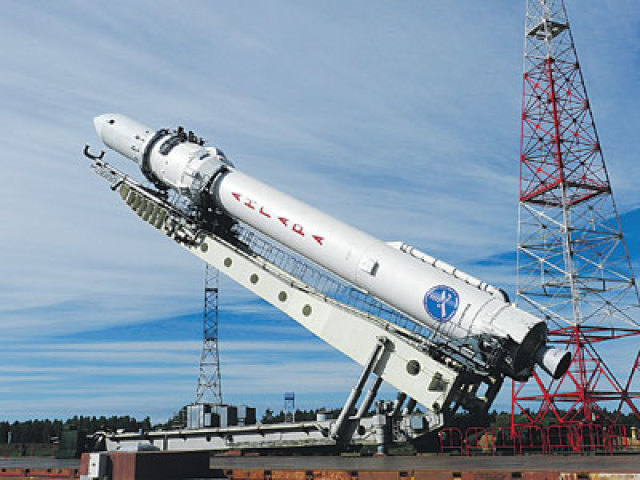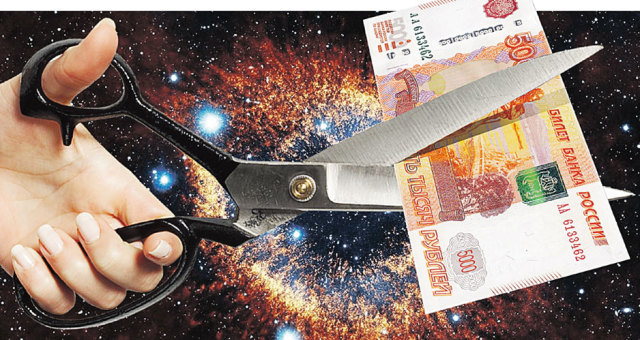State Corporation funding reduces its own mistakes
When the state Duma begins approving the state budget, the question of reducing funding for domestic space exploration is constantly raised. Every year. Now the problem has significantly worsened due to the economic crisis and the worldwide coronavirus pandemic. Employees of the Russian Federal space Agency and the employees of all its many enterprises were waiting for, what programs will be covered and what work will be continued. It seems that cosmonautics is clearly of secondary importance at the government level.
On November 2, Vladimir Putin held a meeting on space research financing, which, unlike all previous meetings, was initiated not by the Kremlin, but by the management of the state Corporation itself. On it, the President, in particular, said: "When determining the amount of funding for space programs, it is extremely important to correctly set priorities. Objectively assess the existing scientific, technological, and production potential of organizations and enterprises in the industry in order to direct budget funds to projects that are most relevant and can give the maximum positive impact." That's why we'll talk about priorities.
The answer to the question of whether we need space exploration in General, and if we need it, what kind, depends entirely on the choice of our country's strategic paradigm – we want to see Russia as a great and powerful power or are ready to settle for the role of a secondary country. For some small public space, which requires considerable expenses, is definitely not necessary and is a worthless burden, which should be disposed of as quickly as possible. The implementation of such an option in Russia would be a fabulous gift for the Western world. If our country switched exclusively to the extraction and sale of minerals, turning into a raw material appendage, the entire West would clap its hands with happiness. Our sworn friends sleep and see that everything goes exactly according to this scenario.
All more or less literate people understand that in the future, Russia can only remain within its borders as a great power, there is no other way. Or it will be crushed, destroyed, torn to pieces. Meanwhile, outer space has already become an arena of intense competition with the obvious prospect of turning into a battleground tomorrow. Therefore, when building a strong and independent Russia, there should be a completely different approach to the development of cosmonautics. This means that our cosmonautics should remain the same mandatory attribute of the state as the anthem, coat of arms and flag.
Correction of mistakes
For the sake of objectivity, it should be recognized that the state of Affairs in Roscosmos is gradually improving. And all the more annoying are the mistakes made, of which many have been made over the past twenty years, and of a very different nature. Some of them look so inexcusable that we can talk if not about direct sabotage, then about the deep dilettantism of the leaders who caused them to be committed.
For example, how could you manage to bring such an advanced enterprise as the Khrunichev state research center to bankruptcy? The current debts of khrunichevites are simply off the scale, although in the best years they only earned 600-700 million dollars a year on commercial launches of the proton launch VEHICLE. Then suddenly they decided to create a holding company on the basis of the center, joining it a number of space enterprises that had economic and technological problems at that time. But instead of getting out of this swamp in solidarity, the Laggards dragged the main enterprise itself to the bottom. As a result, today the holding is in debt like silk, and it will have to solve financial problems for many years to come.
It is also completely unclear why the conversion PH "Rokot"became a joke. Yes, the Ukrainian company refused to supply control systems for it, but six years have passed since the Maidan, and only this year it was decided to switch to Russian systems. Now it will take another two or three years to replace the Ukrainian node with a domestic analog. But at this time, it was possible to launch a pair of carriers every year and gradually pay off the existing debt of the holding to banks. I wonder if Roscosmos can name those responsible for what happened?
Space earnings
The state is directly interested in commercial space, because external funds can reduce the financial burden on the budget. As for Russia, the largest share in the commercial sector has traditionally been provided by services for launching satellites into orbit from foreign customers. At the best of times, this service brought the space industry hundreds of millions of dollars a year. However, American private companies, especially Elon Musk's SpaceX, managed to seriously push the Russians. The reality is that we have lost orders to put heavy satellites into geostationary orbit. Time will tell whether We will be able to return to this market with the Angara-5 and Soyuz-5 launch VEHICLES. While Russia's share in the global market for space services hovers around one percent – it is a shame for a country that has opened the way to space for humanity.

Photo: naked-science.ru
Space communications, which use satellites in different orbits, from low to geostationary, as repeaters, are of crucial importance. A few decades ago, no one could have imagined that thanks to space technologies, reliable communication would be available literally in any corner of the globe. Television and the Internet also cannot exist everywhere without the support of a satellite communication system. In this regard, domestic communications satellites are quite enough to serve customers in Russia and the CIS countries, and so far competitors are not allowed to go further.
Space navigation is by definition a dual-use technology that should be used primarily in the interests of the defense Department. And although our GLONASS navigation system works, there are still many complaints about it.
Many Russians have probably noticed that in recent years, weather forecasts have become noticeably more accurate. This happened, among other things, thanks to the new domestic satellites meteor-M and Electro-L, which work in the interests of the Federal hydrometeorological Center. And there will be new satellites-forecasts will become even more accurate.
Earth remote sensing satellites can detect mineral deposits and fresh water, determine the state of crops and fish stocks in the seas and oceans. The assistance of such satellites in preventing and eliminating the consequences of emergency situations – floods or forest fires-is invaluable. And recently, even archaeologists who made sensational discoveries of lost settlements and ancient fortresses began to use information from satellites. In other words, the development of space technologies can have a huge economic effect in almost all industries and bring new scientific discoveries.
As for space tourism, Russia was a pioneer here. This is a specific type of commercial activity in space, which directly depends on the size of the wallet of the tourist or his sponsors. As they say, any whim for your money. But more than ten years have passed since the last tourist flew, and everything is going to the fact that soon the monopoly of Russia in this area will be violated by the same nimble Mask. So far, Roscosmos has one answer: the Corporation plans to shoot a feature film on the ISS.
There is no doubt that commercial projects in space can and should be engaged in, but it will not be possible to make cosmonautics a self-supporting branch of the economy overnight. Long-term investments are needed here. Of course, private capital should be attracted in every possible way, but public investment is still necessary.
This suggests a comprehensive program of space activities for the next 10-15 years. Both the logic of the development of the world's cosmonautics and the political situation suggest that we should definitely aim for the moon. At the same time it must be large-scale (national), and ambitious, and detailed descriptions of the stages of the space program. And most importantly, it should be provided with stable funding.
The Americans are not in vain actively continue to put together an international coalition around their Artemis program, aimed at building a lunar orbital station with the subsequent landing on the moon and the development of its resources. Let's recall the "moon race" of the 60s, which was initiated by the struggle of two political systems. Now a purely practical interest has been added: lunar resources. Let's remember the American Apollo program, which, in addition to the triumph caused by the landing of astronauts on the moon's surface, allowed us to dramatically advance a number of advanced technologies: electronics, optics, new alloys and composite materials, various sensors and sensors.
Similarly, the Russian space program aimed at the moon should provide not only a purely space effect, but also new technologies for domestic consumption. In the end, this will be both scientific and technological progress, and at the same time the conversion of production in the space industry, which the Russian government so fervently calls for. That's when, and only then, the initial cost of space will pay off many times. But that's not all. The lunar exploration program must become a national project. Then, in addition to economic and technological dividends, it will inevitably raise interest in space exploration in General and in mastering professions related to the space industry, not to mention the profession of an astronaut. Real exploration of the moon will raise a wave of enthusiasm, romance and pride in the country, which is so lacking in recent years, especially for the younger generation. And this will be a very positive message for the entire Russian society.
As for the poetic creativity that excited social networks, namely the lyrics of songs on a space theme written by Dmitry Rogozin and his wife and posted on the official website of the Corporation, few people were surprised: the head of the Corporation is a creative person. But it seems that Dmitry Olegovich will not be evaluated for the quality of his poems, even if they turn out to be brilliant. He will be charged for something else.
Vladimir Volgin
Military-industrial courier newspaper, published in issue # 45 (858) for November 24, 2020

